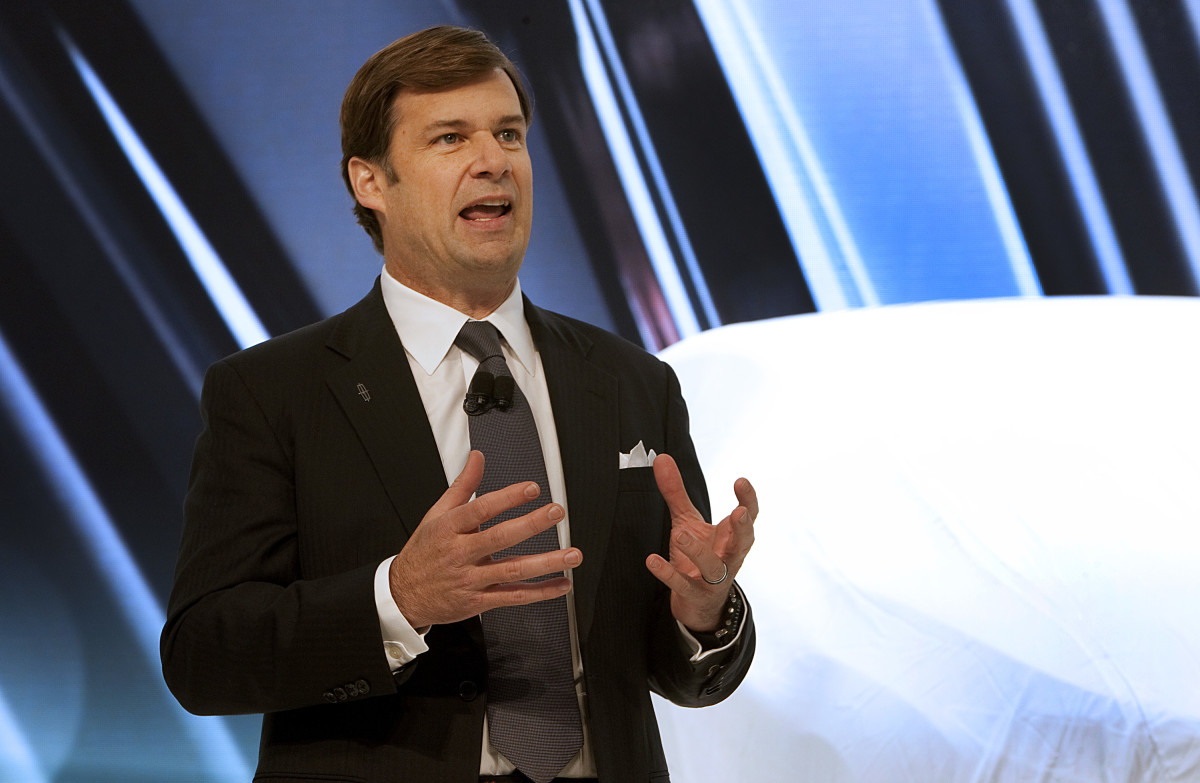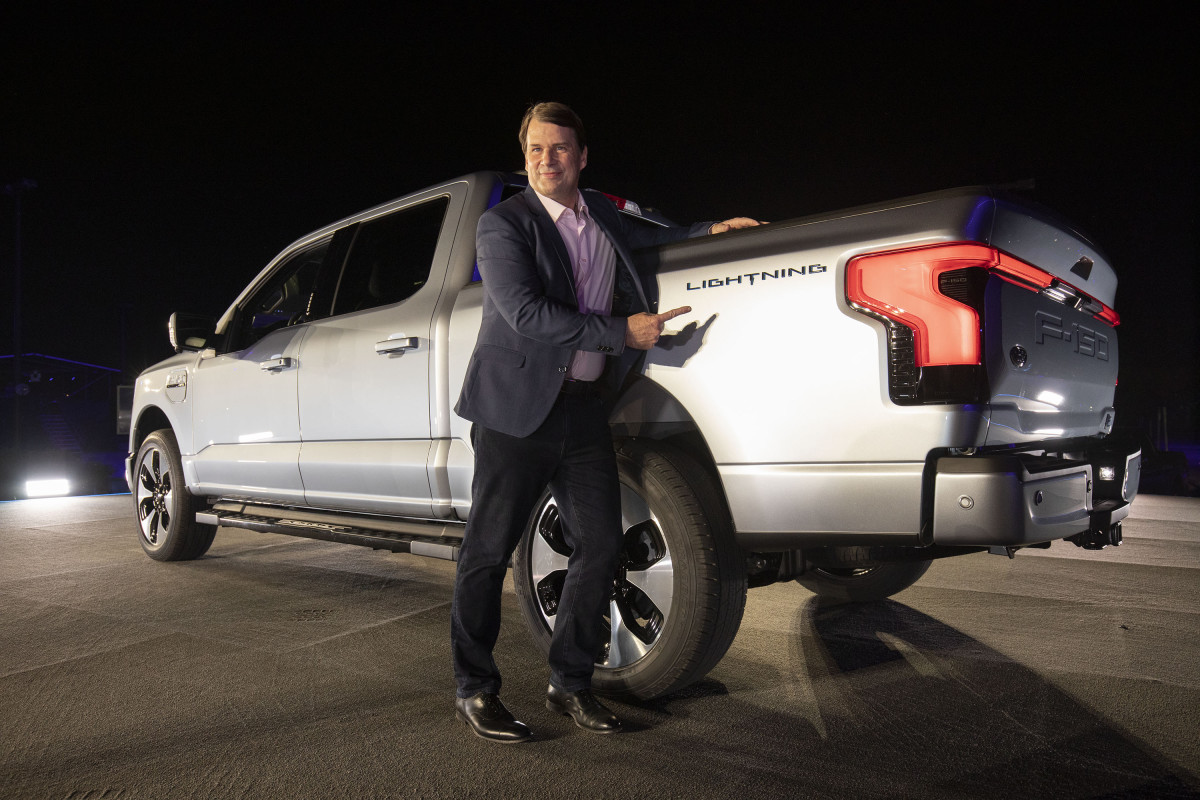
Nearly three years ago, Ford Motor Co. (F) told the world that the "truck of the future" had arrived.
Those were the words the automaker used to describe the F-150 Lightning electric pick-up.
"The F-150 Lightning is a massive moment for our Ford team," Ford President and CEO Jim Farley said in a statement. "America’s No. 1 auto brand is going zero emissions with America’s favorite vehicle."
But the truck of the future hit some potholes on its journey to mainstream acceptance.
Ford said it had halted shipments of all 2024 model year F-150 Lightning electric pickup trucks on Feb. 9 to "ensure quality."
The automaker didn't specify when shipping of the Lightning would resume delivery to dealers, though the automaker noted it has started shipping gas-powered versions of the truck.
"We expect to ramp up shipments in the coming weeks as we complete thorough launch quality checks to ensure these new F-150s meet our high standards." the company said in the statement.
The announcement was the latest in a series of setbacks for Ford's electric vehicle business.
In October, Ford said it would temporarily cut one of three shifts at the Michigan plant that builds the F-150 Lightning.

CEO: 'Customers love the F-150 Lightning'
The company cited supply chain challenges and other problems for cutting production last fall.
However, an official with the United Auto Workers reportedly said in a memo that Ford was canceling the shift due to slowing demand and indicated that the company was looking to build more gasoline-powered trucks instead.
Related: Analyst revamps Ford stock-price target after earnings
"It doesn’t take a rocket scientist to figure out that our sales for the Lightning have tanked," the memo said, according to the Wall Street Journal.
In December, the company said it would cut production of the Lightning in half to just 1,600 vehicles per week to address "changing market demand" and that going forward, it would match production to customer demand.
In January, Ford said it would cut production at its Michigan Rouge Electric Vehicle Center to one shift starting April 1.
“We are taking advantage of our manufacturing flexibility to offer customers choices while balancing our growth and profitability,” Farley said in a Jan. 19 statement. “Customers love the F-150 Lightning, America's best-selling EV pickup.”
“We see a bright future for electric vehicles for specific consumers, especially with our upcoming digitally advanced EVs and access to Tesla's charging network beginning this quarter," he added.
Less than a week later, Ford announced that Edmunds had named the F-150 Lightning its top-rated electric truck for the second year.
Ford is mum on the specifics of its latest issue with the Lightning, but the Detroit Free Press reported that a part that could cause the truck's headlights to stop working may be to blame for the "stop-ship" order.
Ford rolls out incentives to offset sluggish EV sales
Sluggish electric vehicle sales prompted Ford to lower the prices of its Mustang Mach-E compact crossover SUV across the board, ranging from $3,100 to $8,100 in reductions depending on the trim package.
Ford is also reducing prices on the Ford-150 Lightning, offering from $5,000 to $12,500 cash bonuses, depending on the trim.
"Now, someone portrayed the change in the EV market as Darwinian," Farley said during the company's fourth-quarter earnings call with analysts on Feb. 7. "That could be a slow evolutionary change, but we think this has been a seismic change in the last six months of last year."
"That will rapidly sort out winners and losers in our industry," he added.
Farley told analysts that the demand curve for EVs turned out to be very different than the internal combustion engine
Hybrid vehicles would "play an increasingly important role in our industry's transition and will be here for the long run," he said.
GM: 'Pace of EV growth has slowed'
Farley also said Ford had developed "a super-talented Skunk Works team to create a low-cost EV platform."
Ford is hardly alone in its electric vehicle challenges. Last month, General Motors (GM) CEO Mary Barra acknowledged that "the pace of EV growth has slowed, which has created some uncertainty."
More Automotive:
- Analysts unveil Rivian stock price targets ahead of earnings
- Why Mazda is going slow into electric vehicles
- Analyst revamps Ford stock-price target after earnings
Barra told analysts that GM was "encouraged" by industry forecasts that EV sales in the United States will rise at least 10% this year from about 7% in 2023.
And Tesla (TSLA) CEO Elon Musk warned of a sharp slowdown in sales growth this year.
The numbers for electric vehicles sound good, with a record 1.2 million EVs sold in the U.S. last year, according to Kelley Blue Book, "as the slow shift to an electrified future continued unabated."
However, Kelley Blue Book acknowledged these vehicles are expensive, with the average price for a new EV at $50,789.
"Generally speaking, shoppers are still hard-pressed to find a new EV with a manufacturer’s suggested retail price below $40,000," the Cox Automotive company said.
Farley addressed this issue in the earnings call, telling analysts that as the Covid supply shock retreated, "we learned that as you scale EVs to 5,000 to 7,000 units a month and you move into the early majority customer, they are not willing to pay a significant premium for EVs".
"Our data shows that EVs are a clear destination for many customers based on their unique duty cycle," he said. "It's going to take time more than we expected 18 months ago."
Kelley Blue Book maintained that EV growth will continue to slow, but "the momentum is there and is not going away."
What that means for Ford's future F-150 Lightning production remains to be seen.
Related: Veteran fund manager picks favorite stocks for 2024







